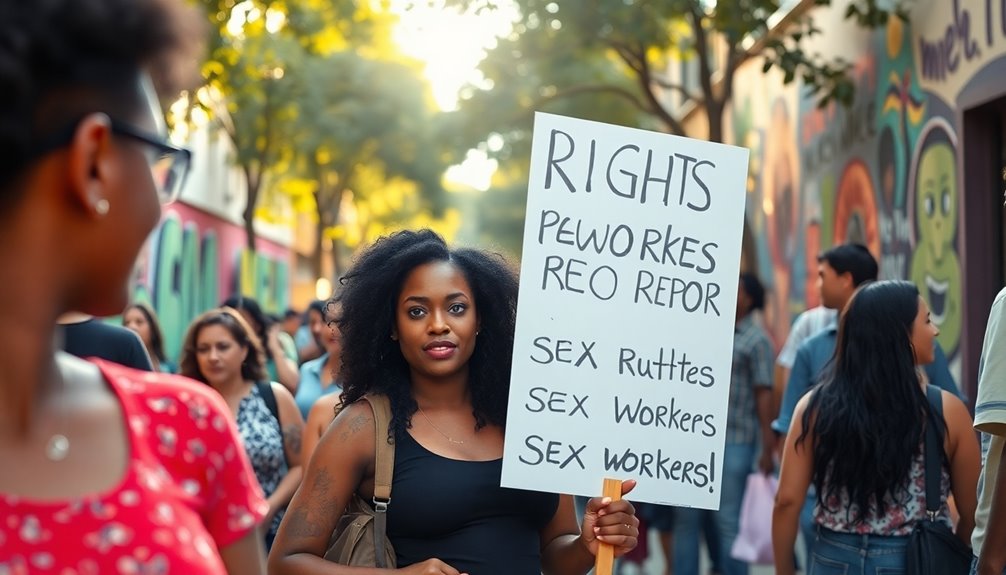To find sex workers safely, start by understanding the local laws, as legality varies by area. Use reputable online platforms like Tryst or Slixa, which cater to independent workers and prioritize safety. When connecting, guarantee clear communication about preferences, boundaries, and health considerations. Keep in mind the risks involved, including potential violence and stigma, and be respectful of their rights. Awareness of the economic impact and ongoing challenges, especially post-pandemic, is crucial too. If you're curious about more resources and advocacy, there's plenty of information available that can guide you further in this topic.
Key Takeaways
- Research local laws on sex work to understand legality and reduce risks before seeking services.
- Utilize reputable online platforms like Tryst or Slixa that prioritize safety and verification for independent sex workers.
- Explore local classifieds and adult service directories, ensuring to read reviews for positive experiences and credibility.
- Engage in direct communication to discuss preferences, boundaries, and safety measures with potential sex workers.
- Connect with advocacy organizations for resources on health, safety, and legal rights related to sex work in your area.
Understanding the Legal Landscape

When you consider finding sex workers, it's vital to grasp the legal landscape surrounding sex work in your area.
The legality of engaging with sex workers varies greatly. For instance, in Canada, selling sex is allowed, but buying it can be criminalized. In the U.S., most states deem full-service sex work illegal for both parties.
Conversely, regions like New Zealand and parts of the Netherlands have legalized street prostitution, offering protections for sex workers.
The UK has specific laws, such as the Sexual Offences Act, that regulate sexual activities while making street prostitution illegal.
Understanding these laws is essential to assess potential risks and legal implications before you engage in the sex industry.
Always research your local laws to stay informed.
Exploring Risks and Safety

While traversing the world of sex work can seem intimidating, understanding the associated risks and safety measures is essential for both clients and workers.
Engaging with sex workers can expose you to significant risks, including physical and sexual violence. Studies show that a staggering 95% of prostitutes face physical assaults, and 75% experience rape.
To mitigate these dangers, open communication about boundaries and health status is imperative. Remember, it's critical to approach interactions with empathy, acknowledging the stigma that impacts sex workers.
Familiarize yourself with local laws to guarantee your safety and avoid legal issues. By prioritizing safety for one another, you can create a more secure environment while maneuvering through the complexities of selling sex.
Health Considerations for Sex Workers

Maneuvering the complexities of sex work also means addressing the health considerations that directly impact sex workers' well-being. Many street sex workers face significant barriers in accessing healthcare, which can heighten health risks and hinder sexual and reproductive health.
Alarmingly, studies show that 95% of these workers experience physical violence, with 75% reporting rape, underscoring the urgent need for safety and health resources. The World Health Organization stresses the necessity of tailored sexual and reproductive health services to promote overall well-being.
Advocacy for recognizing sex work as legitimate labor seeks to improve access to health services and reduce stigma. Additionally, sex workers without pimps often earn about $25/hour, highlighting economic incentives for pursuing safer working conditions and better health resources.
Navigating Online Platforms

Maneuvering online platforms can greatly enhance your experience when seeking sex workers, as these spaces often prioritize safety and accessibility.
Websites like Tryst and Slixa cater specifically to independent sex workers, allowing them to advertise their services effectively. Many sex workers also use social media and personal websites, giving you the chance to verify their credibility and explore their offerings.
Local classifieds and adult service directories can list diverse options, but you should exercise caution and validate the legitimacy of those listings.
Engaging with sex workers typically involves direct communication, where you can discuss your preferences. Additionally, researching reviews and testimonials from past clients can help guarantee you have a positive and safe experience.
Communication and Boundaries

How can you guarantee a positive and respectful experience when communicating with a sex worker? Start by establishing clear communication about your desires and boundaries. This sets the stage for a fulfilling interaction.
Here are some key points to keep in mind:
- Be Open: Discuss specific fantasies, fetishes, or kinks to assure both parties are comfortable and consenting.
- Respect Boundaries: Acknowledge the sex worker's expertise and limits. Maintaining professionalism fosters a safe atmosphere.
- Prioritize Safety: Have an open dialogue about safety measures, including health status and protection, to build trust and mutual respect.
Empowerment and Rights

Understanding the empowerment and rights of sex workers is essential for fostering a respectful and supportive environment. Recognizing sex work as legitimate labor helps advocate for the rights and protections they deserve. Movements for decriminalization and labor rights emphasize this need.
The World Charter for Prostitutes Rights underscores the importance of safety, dignity, and legal recognition globally. Empowering sex workers also involves addressing their barriers to healthcare access, as many struggle to obtain necessary medical services.
Advocacy efforts aim to reduce stigma and promote a better understanding of sex work, which can enhance mental health and community integration. By supporting organizations that champion sex workers' rights, you contribute to better legal protections and a more respectful environment for everyone involved.
Economic Impact and Challenges

When you consider the economic necessity behind street prostitution, it's clear that many individuals turn to this work due to financial hardship and limited job options.
The COVID-19 pandemic further exacerbated their struggles, leading to significant income losses as lockdowns restricted their access to clients.
Understanding these economic challenges is essential in addressing the broader implications for both sex workers and the communities they inhabit.
Economic Necessity Factors
While many people may view sex work through a lens of stigma, economic necessity often drives individuals to this profession as a means of survival.
Street prostitution is frequently linked to financial hardships, with many workers facing poverty. Studies show that street workers without pimps earn around $25 per hour, while those with pimps can earn 50% more, exposing the economic pressures at play.
Here are key factors contributing to this necessity:
- Financial Strain: Many individuals turn to sex work when other job opportunities are scarce.
- Health Care Access: Limited access to healthcare forces workers into risky situations.
- Economic Contributions: Decriminalizing sex work may enhance local economies by promoting safer practices.
Pandemic-Related Income Losses
The COVID-19 pandemic drastically reshaped the landscape for sex workers, leaving many grappling with unprecedented income losses.
Temporary bans on contact professions and movement restrictions led to a complete loss of earnings for many. As financial desperation grew, sex workers became increasingly vulnerable to exploitation, with few alternative employment options available. Many relied on government assistance or community support during lockdowns, exposing the financial instability within the industry.
The closure of businesses and reduced demand resulted in an estimated 50% drop in income for countless individuals. Additionally, access to health services diminished, complicating their ability to seek medical care and support, which only added to the already challenging conditions for sex workers during this tumultuous time.
Stigmatization and Social Perception

When you think about sex work, you might notice how media portrayals shape your views and contribute to stigma.
This negative perception can lead to mental health challenges for sex workers, making it vital to understand their experiences.
Advocacy efforts are essential for empowering these individuals and fostering a more respectful dialogue around their rights.
Media Influence on Perception
Media representation plays an essential role in shaping how society views sex workers, often perpetuating harmful stereotypes that lead to stigmatization. Sensationalized portrayals can reinforce misconceptions, increasing discrimination against those involved in sex work.
It's vital to understand how these narratives affect public opinion and the lives of sex workers.
To foster a more accurate perception, consider these points:
- Awareness: Recognize that media often portrays sex work negatively, impacting societal attitudes.
- Empathy: Support initiatives aimed at promoting accurate and compassionate media coverage.
- Engagement: Advocate for better representation in all forms of media to reduce stigma and improve understanding of sex work as legitimate labor.
Stigma and Mental Health
Stigmatization surrounding sex work has profound effects on the mental health of those involved. Studies show that about 90% of sex workers face discrimination and social exclusion, leading to heightened anxiety and depression.
This stigma can make it tough for them to access healthcare, as many avoid medical attention out of fear of judgment or criminalization. Negative societal perceptions often foster feelings of shame and isolation, worsening mental health issues and diminishing their sense of community.
Additionally, media representation reinforces harmful stereotypes, further marginalizing sex workers.
To improve mental health outcomes, it's essential to reduce stigma through public awareness campaigns and advocacy for sex worker rights, creating a more supportive environment for those in the profession.
Empowerment Through Advocacy
Advocacy plays an essential role in empowering sex workers and reshaping societal perceptions. By changing the language we use, we can reduce stigma and promote respect. This shift away from terms like "prostitution" began in the late 1970s, emphasizing sex work as valid labor.
Here are three key ways advocacy helps:
- Combatting Stigma: Highlighting sex work's legitimacy helps challenge negative societal views, fostering acceptance.
- Improving Mental Health: Reducing stigmatization can help alleviate feelings of isolation among sex workers, promoting better mental well-being.
- Promoting Rights: Advocacy initiatives focus on the rights and agency of sex workers, ensuring their experiences are heard and understood.
COVID-19's Effects on Sex Work

As the COVID-19 pandemic swept across the globe, it markedly impacted sex work, leading to temporary bans on contact professions and a steep decline in street prostitution.
Many sex workers faced economic strain due to lockdowns, making them more vulnerable to exploitation and loss of income.
With healthcare services becoming limited, health risks for sex workers intensified, compounding existing barriers to necessary resources.
The pandemic underscored the need for safety measures, spurring advocacy for better legal protections and rights to guarantee their well-being during and after health crises.
Economic studies suggest that decriminalizing sex work could benefit local economies, especially as communities work to recover financially from the pandemic's impacts.
Resources for Support and Advocacy

When you're looking to support sex workers, knowing where to find advocacy organizations and networks is vital.
These groups offer essential health and safety resources, along with valuable legal rights information.
Advocacy Organizations and Networks
While maneuvering through the complexities of the sex work industry, it's crucial to connect with organizations that provide critical support and advocacy for sex workers.
These groups not only focus on rights and safety but also work to combat stigma surrounding sex work.
Here are three key organizations to explore:
- Sex Workers Outreach Project (SWOP) – Offers resources and advocacy focused on the rights and safety of sex workers.
- Global Network of Sex Work Projects (NSWP) – Connects sex worker organizations globally to promote health, rights, and social justice.
- Local Advocacy Groups – Provide tailored legal assistance, healthcare services, and community support to meet the specific needs of sex workers in your area.
Engaging with these organizations can make a significant difference.
Health and Safety Resources
Connecting with advocacy organizations is just the beginning of supporting sex workers; understanding their health and safety resources is equally important. The World Health Organization emphasizes sexual health resources that improve access to healthcare and advocate for sexual and reproductive rights.
Groups like the Sex Workers Outreach Project and the Global Network of Sex Work Projects provide essential support and community networks focused on health and safety. You can also turn to the National Center for Sex Work for information on rights, health services, and safety protocols tailored for sex workers.
Additionally, many regions offer harm reduction programs, including health services and counseling, to mitigate risks. Campaigns for decriminalization further stress the importance of legal protections to enhance well-being and reduce violence.
Legal Rights Information
Understanding your legal rights is essential for maneuvering the complexities of sex work. Knowledge of local laws can empower you, especially in regions where sex work is decriminalized, allowing you to seek legal recourse against violence and exploitation.
Here are some resources to help you navigate your rights:
- Advocacy Organizations: Connect with groups like the Sex Workers Outreach Project (SWOP) and the World Charter for Prostitutes Rights for guidance and support.
- Legal Aid Services: Utilize hotlines and services in your area that provide confidential advice for legal challenges or discrimination.
- Educational Workshops: Participate in workshops organized by advocacy groups to stay informed about your rights and protections under laws like the Sexual Offences Act in the UK.
Frequently Asked Questions
How Do I Reach Out to a Sex Worker?
When you want to reach out to someone for services, start by choosing the right platform that promotes safety and professionalism.
Use text or phone as your initial contact method, respecting their communication preferences. Be clear about your desires and boundaries, and don't hesitate to ask about rates upfront.
Always verify their online presence to confirm credibility, and maintain a professional tone in all your messages for better mutual understanding.
Conclusion
In summary, finding sex workers involves traversing a complex landscape of legality, safety, and social perception. By understanding these dynamics and prioritizing clear communication and health considerations, you can make informed choices. But isn't it time we challenge the stigma surrounding sex work and recognize the humanity in every individual involved? Whether you're seeking support or simply looking to understand, remember that empathy and respect go a long way in this often-misunderstood world.










